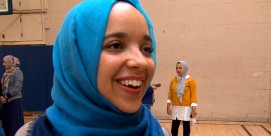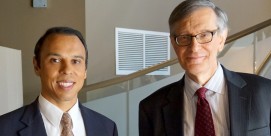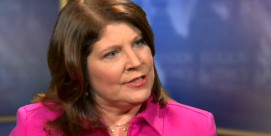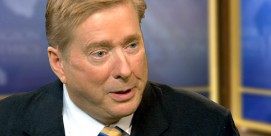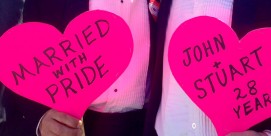In This Episode << SLIDE LEFT TO SEE ADDITIONAL SEGMENTS
Rev. Bear Ride, Sally Craig & Mary Holder Naegeli
Read more of the Religion & Ethics NewsWeekly interviews about same-sex marriage with three Presbyterian ministers in California:
Rev. Bear Ride: The church is our home. I was born into the church, baptized into the church, and raised into the church, and went on to be ordained and served the church. So the church is my home, and I can’t imagine where else I’d want to be to get married.
Rev. Sally Craig: I’m delighted that it’s become a civil right that all people in this state can have equally. But I’m even more delighted to be able to be in a church like All Saints (Episcopal Church in Pasadena) that is progressive, Gospel-based, inclusive of all of us and that we can have a church ceremony with our friends and family and church family. It means everything to be here under the watchful eyes of God and the saints above the community all around us in this special community for us.
Rev. Ride: For us, the marriage is–it’s important that it’s a civil contract between two people, and that, of course, is the groundbreaking aspect of this. But it’s also, in our tradition, a covenant between two people who love each other and promise to spend the rest of their lives together caring for each other and being a supportive community one to each other under the eyes of God, you know, in the grace of a caring community. So it’s both things, and that’s why it makes so much sense for us, and it makes perfect sense for us to be married in a church that can be, at the same time, an agent of the state in signing off on the legal contract aspect of it and blessing the covenantal relationship as well.
Rev. Craig: I’m thinking of marriage as a calling or a vocation that invites us to live into all that we are meant to be within community, where others who are in marriages or loving relationships will be reminded of the vows that they have made to each other, and they’ll call us into account as well, and it’s a community-binding, community creating experience.
Rev. Ride: And, additionally, we did have a wonderful commitment service about seven years ago or so at our house that was a house blessing and a commitment service for our relationship. And that was, as I said earlier, was the covenant part of the celebration. We do want to underscore the legal part, because that’s the justice issue. That’s what we’ve been working for, what the community has been working for, what this church has been working for, as a peace and justice church. So this is really significant to us, that our family will be legally recognized and protected just like any other family. There is a great deal of debate, naturally, within the Presbyterian Church and other denominations about the status of marriage. In fact, the General Assembly in the Presbyterian Church will be, again, debating the nature of marriage. At this point it would be a chargeable offense for a Presbyterian minister to officiate at our wedding, a legal wedding, because in the church’s constitution a marriage is a civil contract, it says, between a man and a woman and a covenant between two people who love each other. That’s archaic language now in California, so that’ll be a very fascinating conversation for them to have. We have many Presbyterian friends who are going to be here to celebrate with us–clergy and friends. This congregation is our home now, and we feel very much we’re solidarity members of All Saints Episcopal Church in Pasadena. And these people are our pastors and our family. And it feels, it makes perfect sense for us to be in a place where it is completely celebrated and embraced.
Rev. Craig: There are different structures within our denominations that are really worth talking about. But here it is not only welcomed, marriages are not only welcomed, but welcomed also joyfully. The vestry went on stand, I think the day after the state did it, and said we will treat all couples that we believe qualified to marry, marry here. Nothing like that has happened in our denomination
Rev. Ride: I believe that God created us in God’s own image, and that God created us to be in a relationship, and I don’t think that language is prescriptive of who, you know, we should march lock-step with. But, rather, God has created us with love and for love to be with another, to be cherished. You know, I think I really don’t understand the folks who talk about the biblical concept of marriage, because if you look at the Bible there are all sorts of different types of marriage. You know, it’s very common to have multiple wives, or concubines are fine, or a levirate marriage, in which case the wife would be required to marry the man’s brother. You know, I mean that was the law of marriage. So I’m not sure–I think we’re picking and choosing the biblical concept of marriage.
Rev. Craig: I think we don’t feel that there’s a rich conversation at this time about how to read the Bible or how to understand the fundamental meanings of love and justice and relationship and community. It’s better to go forward in faith sure and smiling, I think, than to sit and battle biblical verses. I think something happens when people who love each other walk into the room. You can tell if it’s a good and just and ethical and faithful marriage. You can tell that it was meant to be. We don’t even have to speak, but us and the others that were married yesterday and tomorrow and the day after and the day after will just be living witnesses, to use faith language.
Rev. Ride: I trust that this is a hopeful moment as well as a joyful moment and that people will realize that, you know, like any basic, fundamental human right we can now celebrate this as well, that marriage is, you know, marriage is a human right, and we claim that.
*************************
Rev. Mary Holder Naegeli (San Francisco Presbytery): It’s been a hard and difficult decision [not to perform same sex weddings] on one hand because of the population of the Bay Area, but I have decided not to conduct same sex weddings for several reasons. The first reason really starts with the Bible. It is the book that is our primary authority and speaks for God and speaks God’s will to us, and starting in the garden, the very beginning of the Bible story, we have the account of God creating man and woman, and at the end of that wonderful account, beautiful account of Adam and Eve being created, God says a man shall leave his father and his mother and he shall cleave to his wife and the two will become one flesh. Jesus quotes that verse in Matthew 19 in the Gospel and says the creator said this, which for Jesus to say that means this is direct from God, defining marriage as between a man and a woman. And then the Apostle Paul in his letters also quotes that same passage, which puts tremendous weight on it to define marriage that way. And then on the other hand the scripture negatively says that homosexual behavior cannot express the design of God that was made known at creation, and we have several instances from beginning to end of scripture that make that point. There isn’t any wiggle room, there’s no any softening of that position anywhere. So putting the positive case together with the negative case, I can participate only in marriages between a man and a woman.
The Book of Order speaks to this issue particularly in the Directory for Worship, in the definition of marriage in a description of a marriage ceremony and that aspect of the worship life of the church. So there, of course, it says that we understand marriage to be covenant between a man and woman, and no other arrangement is accommodated for in the Book of Order.
The institution of marriage, in theological terms, really revolves around the concept of covenant, which is a rich biblical word to describe first of all the relationship that God established with those he created — a commitment, a love, a regard for. And when we talk about marriage as a covenant we are talking about two people making that kind of commitment to each other. It’s sort of like there’s a special hold in trapeze that trapeze artists use. They don’t hold hands swinging on a trapeze just like this, because if one lets go the grip is gone, but they make a special kind of grip where each grabs the wrist of the other so that if one lets go there is still a bond. And that’s a really nice picture, I think, of the covenant of marriage.
The Bible says positively about marriage that it is, first of all, created by God, and that’s the verse that I hold very dear, this one in the end of chapter 2 of Genesis, “For a man shall leave his father and his mother and shall cleave to his wife, and the two will become one flesh.” Then, and because that’s a reiterated, repeated statement in the scripture two more times, that pretty much is the biblical basis for our understanding of marriage. There are instructions in Paul’s letter about specifics, about roles, whether or not they exist, and the mutuality of marriage, the fact that a person, a married person belongs to his or her spouse. That’s a completely mutual thing. That’s very important in our understanding, biblical understanding, of marriage.
Is gay marriage a sin? Well, we have to take a step back and say that homosexual practice is not God’s design for humanity. Not being God’s design for humanity, having these clear prohibitions in the Scripture make homosexual practice a sin. Homosexual marriage makes permanent a situation that God wants to redeem. That’s one of the big reasons, by the way, why I don’t conduct marriage ceremonies for gay and lesbian people, because why would I, a representative of God, help people make permanent with a vow — I take marriage vows very seriously — but with a vow to make permanent then, seal something that God wouldn’t agree with? God wouldn’t bless that. That’s my basic conscience problem with the whole issue.
The situation that now has been created in the state of California is going to be confusing. Sociologically, there is going to be more and more pressure to not only accept or tolerate, let’s say, something that is not of God’s design, but to promote it and make it normative in the life of Californians, which when you hold a biblical position like I do it makes life really uncomfortable. There are all sorts of issues related to parenthood and adoption, and I can’t even imagine, now this is all pretty new, but that’s going to require a lot of untangling of something that’s gotten confused now.
The Presbyterian Church has business before this assembly to reword the definition of marriage in our Book of Order. It’s possible that the wording could be changed at this assembly but it would have to be ratified by the majority of presbyteries in our country. So nothing can happen that’s instantaneously applicable at this assembly in this regard if it’s a Book of Order change. It’s just like if you were to change the constitution of the United States you’d have to have a majority of states, or probably more than that, actually ratify that. [it is the] same thing in the denomination. I think that there is going to be a vigorous debate. I don’t have a sense at this point of what the folks here are going to do and we’ll find out later in the week. The committee takes it on, has open hearings, listens to a debate, and then later in the week they make a recommendation to the full assembly, which debates it again. So there is a two-phase process here, and anything can happen.
There are three positions I think that clergy hold on the matter of gay marriage. There are people like me, who for biblical reasons, theological constitutional reasons, who are not open to conducting gay marriage. There are people who are all for conducting gay marriages and will do so regardless of what the Presbyterian Church says, and then there are people whose personal feelings may be positive toward conducting gay marriages but wont because it’s unconstitutional in our denomination, and that group of people is in a particularly uncomfortable place, I think. I feel for them because of this, their own personal feeling, it being legal in the state but not legal in the denomination to do so. So there are really three clergy groups I think, and I’m of the first one I mentioned, that I’m not conflicted about it at this time because my beliefs align with what the Book of Order and the confessions say about marriage, and gay marriage is prohibited.

